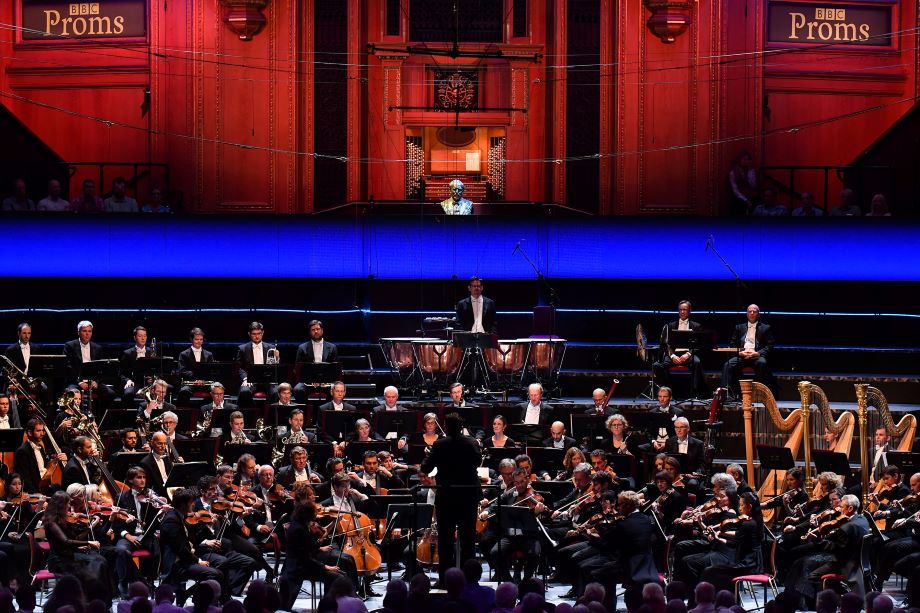
 United Kingdom BBC PROM 47 – Bach and Bruckner: Michael Schönheit (organ), Gewandhausorchester Leipzig / Andris Nelsons (conductor), Royal Albert Hall, London, 23.8.2019. (AS)
United Kingdom BBC PROM 47 – Bach and Bruckner: Michael Schönheit (organ), Gewandhausorchester Leipzig / Andris Nelsons (conductor), Royal Albert Hall, London, 23.8.2019. (AS)

(c) Chris Christodoulou
Bach – Fantasia in G minor, BWV542; Cantata No.147, BWV147 – ‘Jesus bleibet meine Freude’ (transcr. Schmidt-Mannheim); Prelude in E flat, BWV552; Chorale Prelude, ‘Wachet auf, ruft uns die Stimme’, BWV645; Fugue in E flat, BWV552
Bruckner – Symphony No.8 in C minor (1890 version, ed. Nowak)
The majestic statement at the start of Bach’s Fantasia in G minor, headed by a magnificently arresting initial chord, form a highly effective call to attention at the beginning of a concert. Or they should do. In fact, Michael Schönheit’s delivery of this had a workaday, routine quality. And as he continued, there was a lack of firmness in his playing, too much fluidity and a slippery pulse. Unevenness of rhythm continued in the next of his four popular choices, an arrangement of the chorale that is generally known as Jesu, Joy of Man’s Desiring. And why did he separate the E flat major Prelude from its attached Fugue with a rather sloppily played account of the Sleepers, Wake! chorale prelude? Not that joining them together would have made any difference to the limp, de-energised performance given by Schönheit, which in the Fugue even became slightly garbled.
A lack of firm rhythmic pulse is a characteristic of many local church organists, and it was disappointing to find such a fault made all too manifest in such a high-profile presentation.
The juxtaposition of Bach organ works and a Bruckner symphony had seemed like a good idea, especially as Bruckner himself gave six recitals on the Royal Albert Hall organ in 1871. Fortunately, all was redeemed by the performance of the Eighth Symphony.
Nelsons’s high credentials as a Bruckner conductor have been demonstrated previously in London with the Philharmonia Orchestra, in particular a very fine account of the Eighth Symphony in December 2015. But since then he has gone to the top of the conductor tree as Music Director of both the Boston Symphony Orchestra and the Leipzig Gewandhaus Orchestra. His present status has become accompanied by a certain amount of dramatic posturing on the rostrum that wasn’t there before, but no matter, for the quality of music-making is as high as before. At present, we are told, he is recording Shostakovich’s symphonies with the Boston orchestra, Bruckner’s symphonies in Leipzig and the Beethoven symphonies with the Vienna Philharmonic. His choice of the Gewandhaus orchestra for Bruckner is logical, not only for reasons of its long performing history in this composer’s music but for the fact that it still sounds like a traditional mid-European ensemble. The strings in particular have a rich, golden quality of sound and vestiges of the old-world, slightly rustic quality remain in the woodwind. But the brass are less good, a little raw sounding and uneven in ensemble.
Nelsons conducted the work in a very precise manner, with apparently little freedom of expression given to sections and individual orchestra soloists. But what you saw was not the same as what you heard. In fact, the players seemed to have plenty of room to phrase naturally. In the first movement Nelsons chose quite a moderate basic tempo, on which he created pulse variations of the most subtle kind. The music moved forward logically and inexorably, but on the way vivid contrasts of mood were pointed to mirror changes in the character of the music itself. The Scherzo proceeded at a just, middle-of-the road tempo, and just as expected, the trio sections possessed appealing warmth.
The gigantic slow movement presents a mighty challenge to a conductor, and this was met by Nelsons with the greatest sensibility and imagination. The pacing was perfect, there was a consistent sense of line throughout all the contrasted episodes and the huge structure was tellingly revealed. Though it too is episodic, the finale presents the conductor with a slightly easier ride, for there are passages of naturally high energy set against calmer waters. All was superbly realised by Nelsons, and the climactic end of the work emerged from darkness to blazing light in an excitingly triumphant manner. No more needs to be said.
Alan Sanders

Couldn’t disagree more. This performance reminded me of a similar Bruckner performance by the Concertgebouw under Maris Jansons – all exquisite and controlled but no life or momentum. And I don’t get the new fashion for putting all the brass in one corner and trying to get them to sound like a seamless chorale. Bruckner chose to have trumpets, trombones, horns and Wagner tubas and each of these has a distinctive contribution to give. Sorry, much prefer Bruckner played by British orchestras.